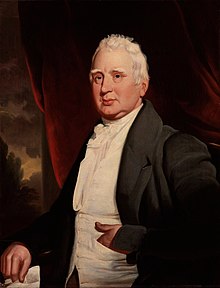William Cobbett
| William Cobbett | |
|---|---|

William Cobbett, portrait in oils, possibly by George Cooke, about 1831. National Portrait Gallery, London.
|
|
| Born |
9 March 1763 Farnham, Surrey, England |
| Died | 18 June 1835 (aged 72) Normandy, Surrey, England |
| Occupation | Pamphleteer, journalist |
| Notable works | Rural Rides |
| William Cobbett | |
|---|---|
|
Member of Parliament for Oldham |
|
|
In office 1832–1835 |
|
| Succeeded by | John Frederick Lees |
| Personal details | |
| Political party | Liberal Party |
William Cobbett (9 March 1763 – 18 June 1835) was an English pamphleteer, farmer, journalist and member of parliament, who was born in Farnham, Surrey. He believed that reforming Parliament and abolishing the rotten boroughs would help to end the poverty of farm labourers, and he attacked the borough-mongers, sinecurists and "tax-eaters" relentlessly. He was also against the Corn Laws, a tax on imported grain. Early in his career, he was a loyalist supporter of King and Country: but later he joined and successfully publicised the radical movement, which led to the Reform Bill of 1832, and to his being elected in 1832 as one of the two MPs for the newly enfranchised borough of Oldham. Although he was not a Catholic, he became a fiery advocate of Catholic Emancipation in Britain. Through the seeming contradictions in Cobbett's life, his opposition to authority stayed constant. He wrote many polemics, on subjects from political reform to religion, but is best known for his book from 1830, Rural Rides, which is still in print today.
William Cobbett was born in Farnham, Surrey, on 9 March 1763, the third son of George Cobbett (a farmer and publican) and Anne Vincent. He was taught to read and write by his father, and first worked as a farm labourer at Farnham Castle. He also worked briefly as a gardener at Kew in the King's garden.
On 6 May 1783, on an impulse, he took the stagecoach to London and spent eight or nine months as a clerk in the employ of a Mr Holland at Gray's Inn. He joined the 54th (West Norfolk) Regiment of Foot in 1783 and made good use of the soldier's copious spare time to educate himself, particularly in English grammar. Between 1785 and 1791 Cobbett was stationed with his regiment in New Brunswick and he sailed from Gravesend to Halifax, Nova Scotia. Cobbett was in Saint John, Fredericton and elsewhere in the province until September 1791, rising through the ranks to become Sergeant Major, the most senior rank of NCO.
...
Wikipedia
